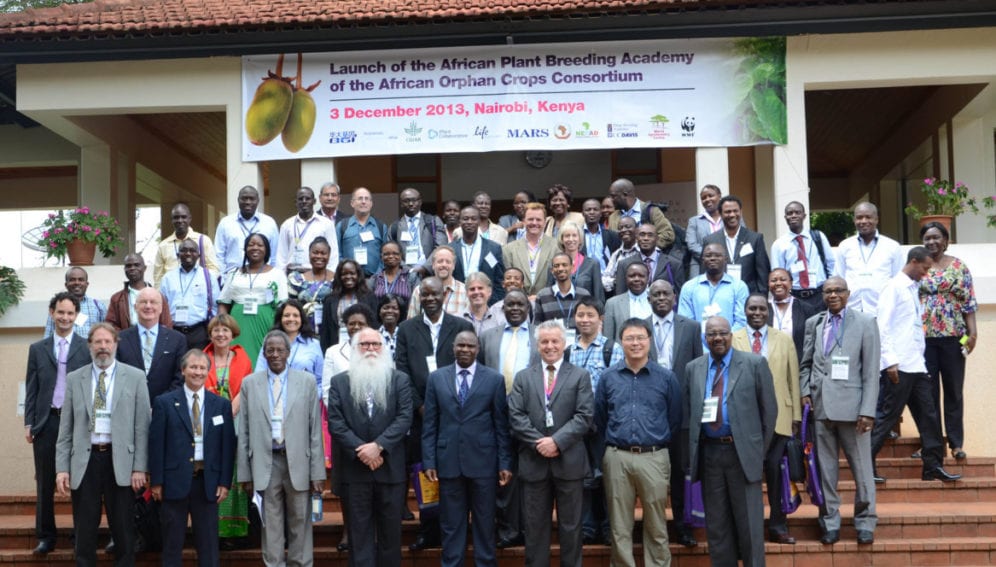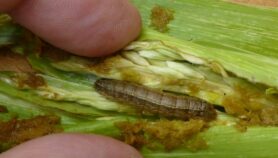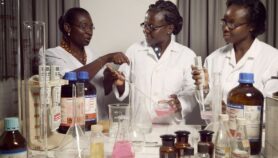By: Alberto Leny
Send to a friend
The details you provide on this page will not be used to send unsolicited email, and will not be sold to a 3rd party. See privacy policy.
[NAIROBI] Food security could receive a major boost following the graduation of the first cohort of 21 plant scientists from 11 African countries, who have received training in techniques for breeding ‘orphan’ crops such as cassava, millet, sorghum and cowpea and cassava.
The scientists from Burkina Faso, Côte d'Ivoire, Ethiopia, Ghana, Kenya, Mozambique, Niger, Nigeria, Rwanda, Senegal and Zimbabwe were graduated by the Africa Plant Breeding Academy, which is located at the World Agroforestry Centre (ICRAF), in Kenya last month (11 December).
“These scientists can now make quicker decisions about plant breeding, leading to higher nutrient content.”
Howard-Yana Shapiro, Mars Incorporated
The academy, which is administered by the US-based University of California, Davis, in collaboration with global partners such as the African Orphan Crop Consortium (AOCC), aims to boost increase food security and help eliminate malnutrition in Africa.
Rita Mumm, the director of the Illinois Plant Breeding Center at the US-based University of Illinois, who facilitated the training, said she was impressed with the trainees’ knowledge and passion to translate experience at the academy into practical agricultural development results for their countries.
“I have very high expectations that the intensive training they received in genetics, statistics and plant breeding will produce enormous benefits for their countries through new DNA technology and improved cultivars for farmers,” Mumm told SciDev.Net.
The course for active plant breeders was organised through a US$1 million funding by Mars Incorporated, a global manufacturer of confectionary, which is headquartered in the United States, according to Mumm.
“These scientists can now make quicker decisions about plant breeding, leading to higher nutrient content,” said Howard-Yana Shapiro, Mars Incorporated chief agricultural officer. “Only 57 plants in the world have been sequenced. Now we are adding another 101 traditional African plants.”
Experts say traditional African orphan crops are under-researched and under-valued by decision-makers and do not feature in global trade and export-oriented economies, although they have huge implications on smallholders’ productivity, livelihoods, food security and nutrition.
“Asian countries turned from food deficit to food surplus countries after a green revolution propelled by modern technology and plant breeding,” said ICRAF director-general Tony Simons. “Africa missed [out] on the opportunity because of low investment and infrastructural capacity levels.”
Simon explained that the academy will over the next five years train 250 African plant breeders to mainstream traditional African crops into the strategic food value chain, adding that a new class of 30 top scientists will begin their training in June 2015, with priority to female scientists.
“Gender has a major role in food production and marketing. Not that we want to disempower men; we seek to promote equality and build synergy where men, women, boys and girls work as equals together enhancing science and technology opportunities for development,” Simons added.
Diran Makinde, director of African Biosafety Network of Expertise, an agency of NEPAD (New Partnership for Africa's Development), urges African countries to provide more support to plant breeders to help boost smallholders’ livelihoods.
This article has been produced by SciDev.Net's Sub-Saharan Africa desk.














